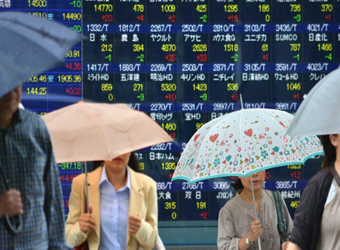Japan’s Nikkei 225 rose 1.23 percent after closing barely in positive territory in the previous session. Automakers recorded gains in the morning.
Toyota rose 0.87 percent, Honda jumped 1.86 percent and Mitsubishi Motors tacked on 2.51 percent. Technology names were also mostly higher, with SoftBank Group advancing 2.16 percent.
The Bank of Japan on Tuesday held monetary policy steady following a two-day meeting, a move that was widely expected.
The central bank’s move to slightly trim its purchases of Japanese government bonds earlier this month led to some speculation about potential tightening, although the move away from ultra-easy policy is seen as some ways away by some in the market. The dollar slid against the yen following that announcement. The greenback traded at 110.78 at 1:02 p.m. HK/SIN, after falling as low as 110.56 on the news. That was below levels around the 110.9 handle seen earlier during Asian trade.
The dollar slid against the yen following that announcement. The greenback traded at 110.78 at 1:02 p.m. HK/SIN, after falling as low as 110.56 on the news. That was below levels around the 110.9 handle seen earlier during Asian trade.
Across the Korean Strait, the Kospi added 1.01 percent despite automakers slipping into negative territory during the session.
Shares of LG Display were rose 6.02 percent after the company reported fourth-quarter earnings fell 95 percent from a year ago, as other tech names traded mostly higher.
LG Electronics, meanwhile, traded flat percent after earlier falling more than 2 percent following news President Donald Trump had approved tariffs on certain washing machines. Samsung Electronics, which also produces washing machines, was higher by 1.41 percent.
The South Korean government said it would raise the matter to the World Trade Organisation, characterizing the U.S. move as “excessive.”
Over in Sydney, the S&P/ASX 200 climbed 0.79 percent on strength in the energy sector, with Santos gaining 1.17 percent in the morning. The financials sector, which had broadly declined in the last session, rose 0.8 percent on Tuesday.
Positive sentiment was also seen in greater China markets. The Hang Seng Index rose 1.25 percent on Tuesday after touching an all-time high for the fourth consecutive session on Monday. Financials, which are heavily-weighted constituents on the index, were in positive territory: HSBC rose 0.59 percent, insurer AIA advanced 1.44 percent and China Construction Bank was up 3.33 percent.
Casino stocks traded significantly higher. Galaxy Entertainment rose 2.35 percent and Sands China surged 1.77 percent.
Mainland markets also saw gains in the morning. The Shanghai composite advanced 0.76 percent and the Shenzhen composite rose by a more moderate 0.19 percent.
U.S. stocks closed higher on Monday, paring early losses after the Senate reached a short-term compromise to end a government shutdown that began last week. The stopgap bill approved by the Senate on Monday will keep the U.S. government open through Feb. 8.
The House of Representatives subsequently voted and passed the bill to reopen the government, which Trump subsequently signed into law.
The Dow Jones industrial average advanced 0.55 percent, or 142.88 points, to close at 26,124.60. The S&P 500 and Nasdaq composite both touched record highs before closing nearly 1 percent higher on the day.
“News of a deal to re-open the government has predictably been offered as an excuse for yet new record highs being chalked up,” but a better reason for the gains was likely the “ongoing lifting of earnings expectations by stock market analysts, driven in large by assessment of the tax deal and … ongoing slippage in the dollar,” Ray Attrill, head of foreign exchange strategy at National Australia Bank, wrote in a morning note.
In currencies, the dollar index, which tracks the U.S. currency against six peers, was steady at 90.367 at 1:05 p.m. HK/SIN.
The Australian dollar fell back below the $0.80 mark to trade at $0.7988 after trading as high as $0.8029 earlier.
Source: CNBC
